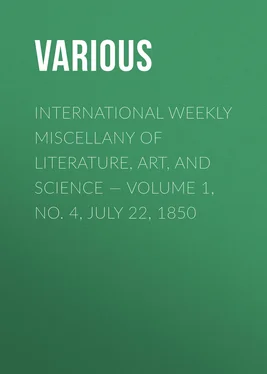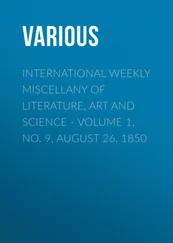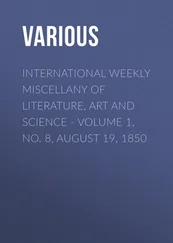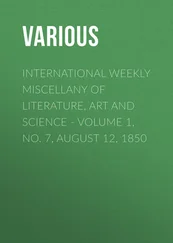Various - International Weekly Miscellany of Literature, Art, and Science — Volume 1, No. 4, July 22, 1850
Здесь есть возможность читать онлайн «Various - International Weekly Miscellany of Literature, Art, and Science — Volume 1, No. 4, July 22, 1850» — ознакомительный отрывок электронной книги совершенно бесплатно, а после прочтения отрывка купить полную версию. В некоторых случаях можно слушать аудио, скачать через торрент в формате fb2 и присутствует краткое содержание. Жанр: foreign_antique, periodic, foreign_edu, на английском языке. Описание произведения, (предисловие) а так же отзывы посетителей доступны на портале библиотеки ЛибКат.
- Название:International Weekly Miscellany of Literature, Art, and Science — Volume 1, No. 4, July 22, 1850
- Автор:
- Жанр:
- Год:неизвестен
- ISBN:нет данных
- Рейтинг книги:4 / 5. Голосов: 1
-
Избранное:Добавить в избранное
- Отзывы:
-
Ваша оценка:
- 80
- 1
- 2
- 3
- 4
- 5
International Weekly Miscellany of Literature, Art, and Science — Volume 1, No. 4, July 22, 1850: краткое содержание, описание и аннотация
Предлагаем к чтению аннотацию, описание, краткое содержание или предисловие (зависит от того, что написал сам автор книги «International Weekly Miscellany of Literature, Art, and Science — Volume 1, No. 4, July 22, 1850»). Если вы не нашли необходимую информацию о книге — напишите в комментариях, мы постараемся отыскать её.
International Weekly Miscellany of Literature, Art, and Science — Volume 1, No. 4, July 22, 1850 — читать онлайн ознакомительный отрывок
Ниже представлен текст книги, разбитый по страницам. Система сохранения места последней прочитанной страницы, позволяет с удобством читать онлайн бесплатно книгу «International Weekly Miscellany of Literature, Art, and Science — Volume 1, No. 4, July 22, 1850», без необходимости каждый раз заново искать на чём Вы остановились. Поставьте закладку, и сможете в любой момент перейти на страницу, на которой закончили чтение.
Интервал:
Закладка:
Geoffrin's house was the first school of bon ton in Europe: Stanislaus Poniatowsky, even after he became King of Poland, addressed her by the tender name of mother, invited her to Warsaw, and received her as a personage of high distinction. All the German courts which followed the fashion, paid correspondents in order to be made acquainted with the trifles which occupied that circle. Catherine II. had no sooner mounted the throne than she began to pay a commissioner at this literary court, and even Maria Theresa distinguished Madame Geoffrin in a remarkable manner, on her return from Poland. Besides, we are made acquainted by Marmontel, who ranked his hostess among the gods of this earth, with the anxiety and cautiousness of this lady of the world, who afterward broke altogether with the chiefs of the new literature, and most humbly did homage to the old faith, because she had never wholly forsaken her old prejudices.
The able writers of the time were used by Geoffrin only as means to promote her objects, to gain a reputation for splendor, and to glorify France. The King of Prussia sought her society, in order to refresh and cheer his mind when he was worn out with the cares and toils of government.
Madame Geoffrin opened her house regularly on Mondays for artists, and on Wednesdays for men of learning; but as she neither understood the arts nor sciences, she took part in the conversation only so far as she could do so without exposing her weak side. She understood admirably how to attract the great men to her house, to whose houses she herself very seldom went; and as long as the appearance of fashionable infidelity and of scoffing, which was then the mode in the higher circles, was necessary to this object, she carefully concealed her real religious opinions.
The weak Marmontel, who, according to his own description, was only fitted for superficial conversation and writing, boasts of the prudence, foresight and skill of his protectress, and shows how she understood the way to gain the confidence of others without ever yielding her own. This distinguished art made the house of Madame Geoffrin invaluable to the great world, and to those learned men who wished to shine in this kind of society, and to cultivate and avail themselves of it, for such people must learn above all things neither to say too much nor too little. This society, indeed, was not calculated for any length of time for a Rousseau or a Diderot. Even the great admirers of Geoffrin admit that savoir vivre was her highest knowledge, she had very few ideas with respect to anything besides; but in the knowledge of all that pertained to the manners and usage of good society, in the knowledge of men, and particularly of women, she was deeply learned, and was able to give some very useful instructions.
It would lead us too far into the history of the following period, to enumerate and characterize the members of these regular societies. It may suffice to mention, that in addition to all the guests who frequented Madame de Tencin's, all the friends of Voltaire's school, and at first also Rousseau, made a part of the society at the house of Madame Geoffrin. We have already remarked that no prince, minister, or distinguished man of all Europe came to Paris who did not visit Madame Geoffrin, and think it an honor to be invited to her house, because he there found united all that was exclusively called talent in Europe.
Kaunitz also, who was then only a courtier in Versailles, came to Madame Geoffrin's parties. He was a man who combined in a most surprising manner true philosophy and a deep knowledge of political economy, with the outward appearance of a fop and a trifler. Among the other distinguished men who lived in Paris, Marmontel names with high praise the Abbé Galliani, Caraccioli, who was afterward Neapolitan ambassador, and the Swedish ambassador, Count Creutz.
Marmontel was so much delighted with this society, even at a very advanced age, that he gives us also accounts of their evening parties: "As I was in the habit of dining with the learned and with the artists at Madame Geoffrin's, so was I also of supping with her in her more limited and select circle. At these petits soupers there was no carousing or luxuries,—a fowl, spinach and pancakes constituted the usual fare. The society was not numerous: there met together only five or six of her particular friends, or even persons of the highest rank, who were suited to each other, and therefore enjoyed themselves." It appears distinctly from the passage already quoted from Marmontel, how the high nobility on these occasions treated the learned, and how the learned demeaned themselves toward the nobility. It appears, therefore, that Rousseau was not in error when he alleged that emptiness and wantonness only were cherished in these societies, and that the literature which was then current was only a slow poison.
Madame du Deffant appeared on the stage of the great world contemporaneously with Geoffrin, and attained so high a degree of celebrity, that the Emperor Joseph paid her a visit in her advanced period of life, and thus afforded her the opportunity of paying him that celebrated compliment which is found related in every history of France. With respect to Deffant, however, we must not listen to Marmontel; she stood above his rhymes, his love tales, his sentimental wanton stories, and besides, he knew her only when she had become old. What we Germans name feminine and good morals formed no part of the distinction of Deffant, but talents only. Like Tencin, she was ill-reputed in her youth on account of her amours, and reckoned the Regent among her fortunate wooers; at a later period she turned her attention to literature.
Deffant brought together at her house all those persons whom Voltaire visited when he was in Paris; among these the President Hénault, and, at a later period of which we now speak, D'Alembert attracted to this circle distinguished foreigners and Frenchmen, who made any pretensions to culture and education. Deffant assumed quite a different tone among the learned from that of Geoffrin. She set up for a judge in questions of philosophy and taste, and carried on a constant correspondence with Voltaire. Among celebrated foreigners, the Englishman Horace Walpole played the same character in this house which the Swede Creutz had assumed in that of Geoffrin. Deffant and her Walpole became celebrated throughout Europe by their printed correspondence, which, on account of its smoothness and emptiness, like all books written for the great world, found very numerous readers.
Deffant, moreover, like Geoffrin. was faithless to her friends; she wished indeed to enjoy the most perfect freedom in their society, but she was unwilling that they should publish abroad this freedom. And she strongly disapproved of the vehemence with which her friends assailed the existing order of things.
When she afterward lost a considerable part of her property, and became blind, she occupied a small dwelling in an ecclesiastical foundation in Paris, but continued to receive philosophers, poets and artists in her house; and in order to give a little more life to the conversation, she invited a young lady whose circumstances were straitened to be her companion. This was Mademoiselle l'Espinasse. L'Espinasse was not beautiful, but she was young, amiable, lively, and more susceptible than we in Germany are accustomed either to allow or to pardon. Deffant, on the other hand, was witty and intelligent, but old, bitter, and withal egotistically insensible. The boldest scoffers assembled around L'Espinasse, and there was afterward formed around her a circle of her own. Deffant turned day into night, and night into day. She and the Duchess of Luxembourg, who was inseparable from her, received learned distinguished personages and foreigners, from six o'clock in the evening during the greater part of the night.
Читать дальшеИнтервал:
Закладка:
Похожие книги на «International Weekly Miscellany of Literature, Art, and Science — Volume 1, No. 4, July 22, 1850»
Представляем Вашему вниманию похожие книги на «International Weekly Miscellany of Literature, Art, and Science — Volume 1, No. 4, July 22, 1850» списком для выбора. Мы отобрали схожую по названию и смыслу литературу в надежде предоставить читателям больше вариантов отыскать новые, интересные, ещё непрочитанные произведения.
Обсуждение, отзывы о книге «International Weekly Miscellany of Literature, Art, and Science — Volume 1, No. 4, July 22, 1850» и просто собственные мнения читателей. Оставьте ваши комментарии, напишите, что Вы думаете о произведении, его смысле или главных героях. Укажите что конкретно понравилось, а что нет, и почему Вы так считаете.












